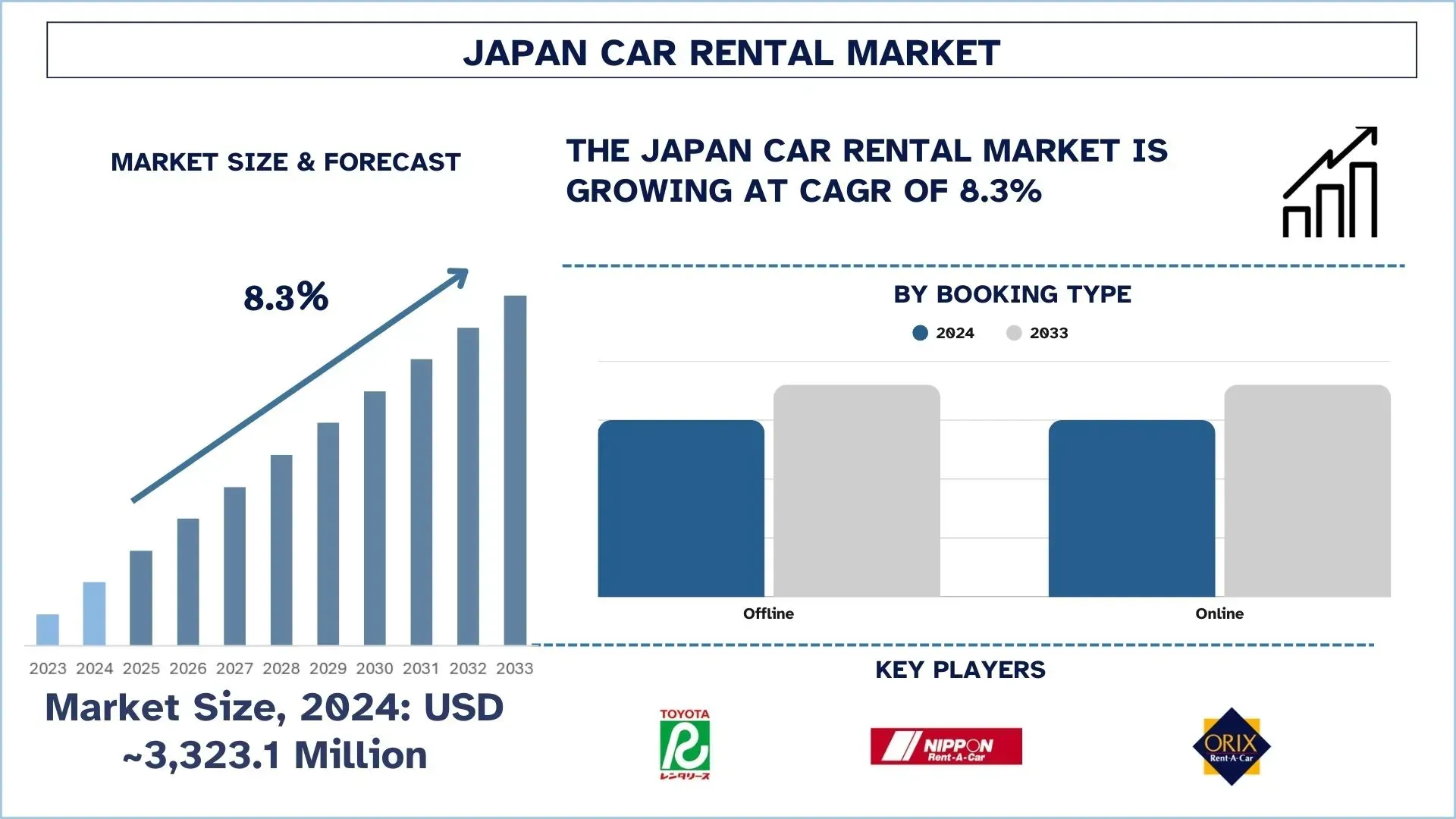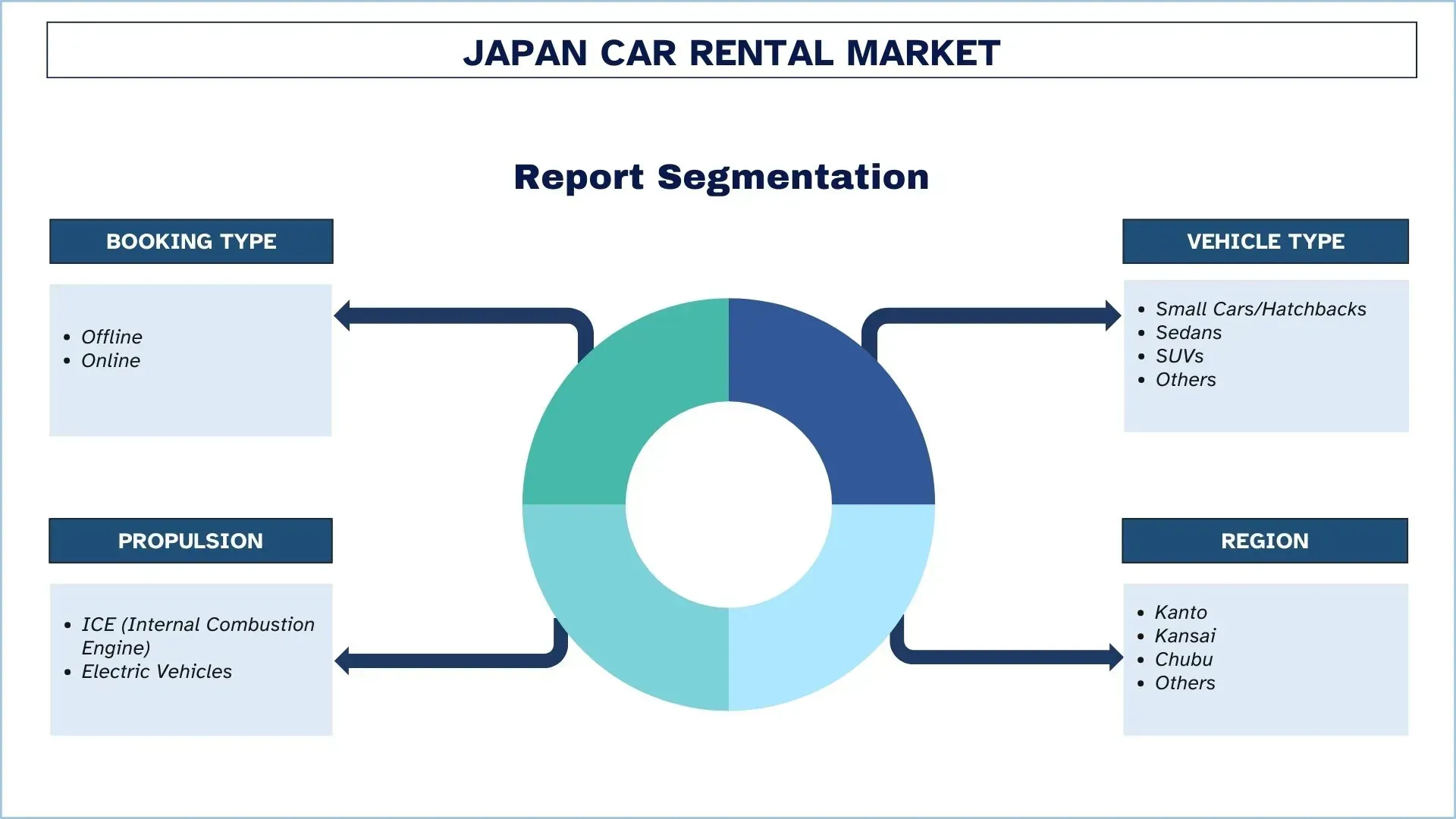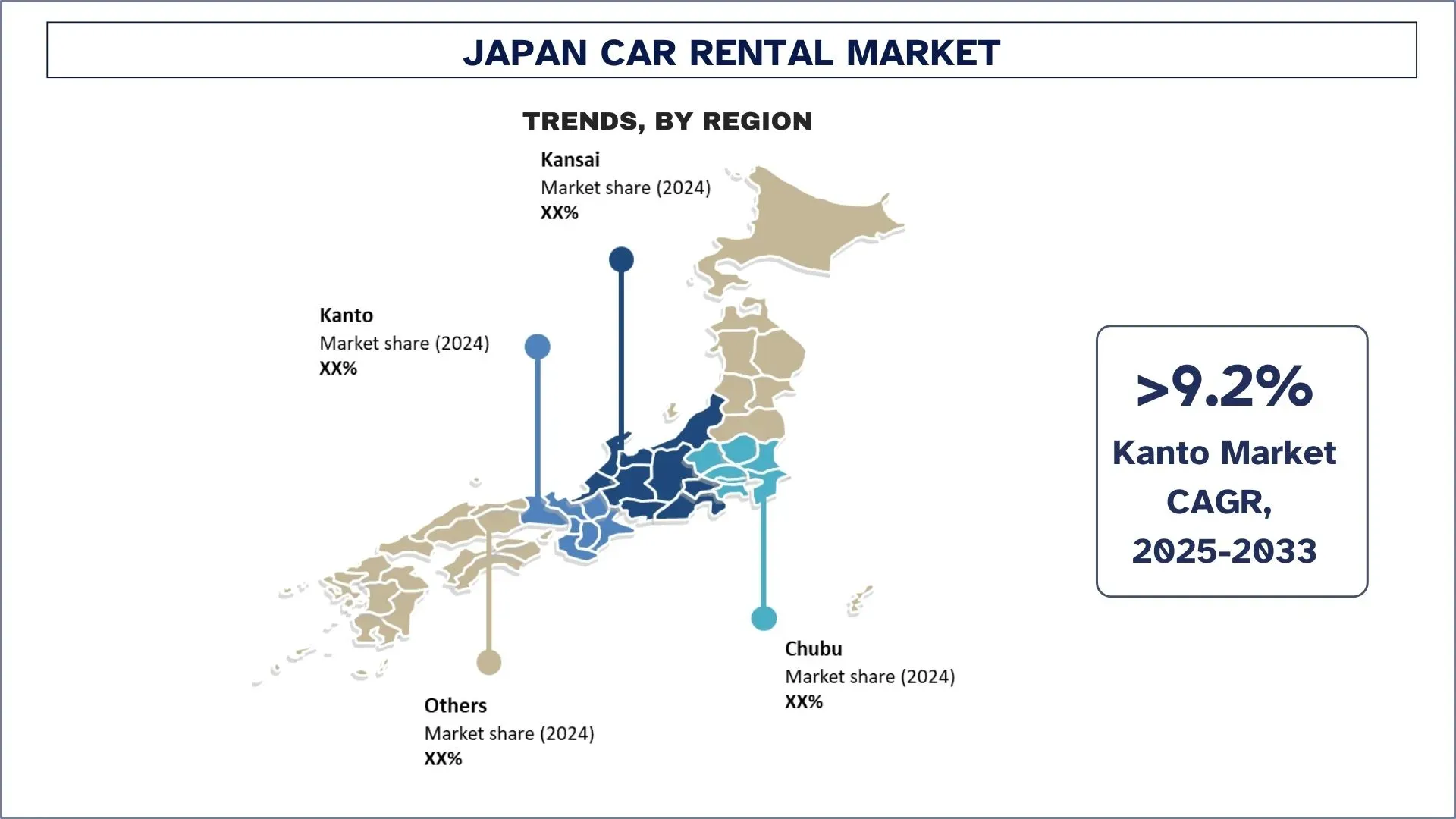- Home
- About Us
- Industry
- Services
- Reading
- Contact Us
Japan Car Rental Market: Current Analysis and Forecast (2025-2033)
Emphasis on Booking Type (Offline, and Online); Vehicle Type (Small Cars/Hatchbacks, Sedans, SUVs, and Others); Propulsion (ICE (Internal Combustion Engine), and Electric Vehicles), and Region (Kanto, Kansai, Chubu, and Others)

Japan Car Rental Market Size & Forecast
The Japan Car Rental Market was valued at USD ~3,323.1 million in 2024 and is expected to grow to a strong CAGR of around 8.3% during the forecast period (2025-2033F), owing to the rising domestic tourism and increasing preference for flexible mobility solutions.
Japan Car Rental Market Analysis
The car rental industry is an essential part of Japan’s travel and transport ecosystem, which will allow for the availability of temporary vehicles for both domestic destination tourists and international tourists. Global needs of Japan rental car services cover a variety, including travelers who want to travel unaccompanied outside the city limits and business travelers who require vehicles for conferences and other events. The key growth of the market is based on such factors as vast inbound tourism, the attractiveness of independent driving, and the development of domestic tourism. The increasing number of tourists interested in major urban sites as well as rural destinations has caused an enormous rise in the rental car demand, for instance, in areas such as Tokyo, Osaka, and Hokkaido. In a more recent development, the market has shifted to favour eco-friendly moves as rental businesses have been encouraged to augment their inventory of vehicles with electric and hybrid models to fit the environmental awareness.
Going forward, the rental car market in Japan is likely to record growth as the influx of tourism from China, South Korea, and the United States improves. From time to time, Japan will be faced with an increase in tourism because China will undergo in growth of its middle class and an increase in international travel. Deriving strength from the area’s physical closeness and common heritage, travel from South Korea will aid Japan’s rental car market, which will also benefit as a result of the United States’ robust business and vacation industry. The rapid inflow of international clients, plus Japan’s surging domestic tourism, is likely to increase rental vehicle demand. In response to its expansion, the rental sector might extend availability of digital interfaces, promote green cars, and offer alternatives such as car sharing and subscription, among other ventures, to cater to the tastes of Japanese and international guests.
A notable development in the Japan rental car market is the acquisition of Smartbox by Nature Mobility in 2023. Nature Mobility, a leading player in the mobility-as-a-service (MaaS) sector, acquired Smartbox, a digital car rental and vehicle-sharing platform, to enhance its service offerings. This acquisition allows Nature Mobility to expand its digital infrastructure, integrating Smartbox's innovative platform for seamless car rentals and shared mobility services. The move is indicative of the increasing importance of technology and digitalization in the Japanese car rental market.
Japan Car Rental Market Trends
This section discusses the key market trends that are influencing the various segments of the Japan Car Rental market, as found by our team of research experts.
Digitalization and App-Based Rentals
The Japanese rental car industry is rapidly changing: more car hire companies are starting to use the digital platforms that will allow customers to book cars even more conveniently. Customers derive additional convenience when selling via digital channels because they can access availability immediately, reserve their rental, and even make payments without physical contact. Although digital technology leads to higher customer satisfaction with advanced booking options, it gives the rental companies the ability to more effectively manage their fleets. Rakuten Travel has drawn attention with the launch of its intuitive car rental app, allowing one to book in about 3000 places in Japan, for international travelers.
Focus on Domestic Travelers Post-COVID
The COVID-19 outbreak has brought up a new perspective of domestic consumers for the rental car industry in Japan. Japanese renters are floating to domestic destinations with overseas travel being contained by the pandemic, and this has made the rental vehicles a center of interest. According to JTB Corp., the number of domestic travelers in 2025 is projected at 305 million (102.7% of 2024). The travel spending per capita is estimated at ¥47,800 (101.1% of 2024). Total domestic travel spending is forecast at ¥14,590 billion (103.8% of 2024).
Japan Car Rental Industry Segmentation
This section provides an analysis of the key trends in each segment of the Japan Car Rental market report, along with forecasts at the regional and state levels for 2025-2033.
The offline segment held the dominant share of the Japan Car Rental market in 2024.
Based on Booking Type, the market is bifurcated into Offline and Online. Among these, the Offline segment is leading the market. In the offline rental car market of Japan, the major factors are the desire of customers to have direct face-to-face service, facilitation of immediate vehicle availability, and the guarantee provided by personal contact. It is not unusual that tourists, mainly from Japan, get some comfort from talking directly to staff at rental desks to confirm minor details on a vehicle, insurance, and rental for short-term. Customers’ advantage through offline channels is that they will get the opportunity to view the vehicles first-hand before renting them. Apart from that, placing rental counters in locations such as airports, train stations, and destination hotspots answers the call for emergency rentals, thus sustaining the demand for offline rentals. While digital channels have advanced, the offline segment remains important due to its one-on-one interaction, quick and reliable provision.
The Small Cars/Hatchbacks market is expected to grow with a significant CAGR during the forecast period (2025-2033) of the Japan Car Rental Market.
Based on the Vehicle Type, the market is segmented into Small Cars/Hatchbacks, Sedans, SUVs, and Others. Among these, Small Cars/Hatchbacks are the largest contributor to the Japan Car Rental industry. The car rental business in Japan is dominated by hatchbacks and other small cars because they cost less and operate with less fuel consumption of fuel and are also easy to navigate on the urban streets. With their space-saving model, small cars are more maneuverable and park more easily, comforting drivers in the busy city atmosphere of Tokyo. A surge of interest in small, fuel-efficient cars, which resonate well with the earth-caring drivers today, has occurred due to the increasing awareness of environmental issues. Because they are common and do not entail high maintenance costs, such cars remain popular in tourists’ preferences as a means of simple and cheap transportation.

Kanto Region will grow the Japan Car Rental market during the forecast period.
The Kanto region dominated the market. The fact that Tokyo is Japan’s number one tourist resort and a top entry point for international travelers means very high demand for rental cars in the Kanto region. Being the home of Japan’s business and culture hotspot, the city of Tokyo attracts millions of tourists, so the need for flexible and helpful transportation solutions grows. Having life in the busy city and the presence of big business areas brings the need for rental cars for personal and corporate movements in the region. Besides, the extensive transportation network of Kanto’s region, with airports such as Narita and Haneda, makes it an easy takeoff point for tourists traveling throughout Japan. Because of its high degree of tourism, business requirements, and easy options for transportation, the Kanto area is identified by car rental companies as a top field market in Japan.

Japan Car Rental Industry Competitive Landscape
The Japan Car Rental market is competitive, with several global and international market players. The key players are adopting different growth strategies to enhance their market presence, such as partnerships, agreements, collaborations, new product launches, geographical expansions, and mergers and acquisitions.
Top Japan Car Rental Companies
Some of the major players in the market are Toyota Rent a Car, Nippon Rent-A-Car, ORIX Rent a Car, Times Car Rental, Nissan Rent a Car, Budget Rent a Car, Sky Rent a Car, Hertz, Sixt, and Europcar.
Recent Developments in the Japan Car Rental Market
A notable development in the Japan rental car market is the acquisition of Smartbox by Nature Mobility in 2023. Nature Mobility, a leading player in the mobility-as-a-service (MaaS) sector, acquired Smartbox, a digital car rental and vehicle-sharing platform, to enhance its service offerings. This acquisition allows Nature Mobility to expand its digital infrastructure, integrating Smartbox's innovative platform for seamless car rentals and shared mobility services. The move is indicative of the increasing importance of technology and digitalization in the Japanese car rental market.
Japan Car Rental Market Report Coverage
Report Attribute | Details |
Base year | 2024 |
Forecast period | 2025-2033 |
Growth momentum | Accelerate at a CAGR of 8.3% |
Market size 2024 | USD ~3,323.1 million |
Regional analysis | Kanto, Kansai, Chubu, and Others |
Major contributing region | Kanto is expected to grow at the highest CAGR during the forecasted period. |
Companies profiled | Toyota Rent a Car, Nippon Rent-A-Car, ORIX Rent a Car, Times Car Rental, Nissan Rent a Car, Budget Rent a Car, Sky Rent a Car, Hertz, Sixt, and Europcar |
Report Scope | Market Trends, Drivers, and Restraints; Revenue Estimation and Forecast; Segmentation Analysis; Demand and Supply Side Analysis; Competitive Landscape; Company Profiling |
Segments Covered |
Reasons to Buy the Japan Car Rental Market Report:
The study includes market sizing and forecasting analysis confirmed by authenticated key industry experts.
The report briefly reviews overall industry performance at a glance.
The report covers an in-depth analysis of prominent industry peers, primarily focusing on key business financials, type portfolios, expansion strategies, and recent developments.
Detailed examination of drivers, restraints, key trends, and opportunities prevailing in the industry.
The study comprehensively covers the market across different segments.
Deep dive regional level analysis of the industry.
Customization Options:
The Japan Car Rental Market can further be customized as per the requirements or any other market segment. Besides this, UnivDatos understands that you may have your own business needs; hence, feel free to contact us to get a report that completely suits your requirements.
Table of Content
Research Methodology for the Japan Car Rental Market Analysis (2023-2033)
We analyzed the historical market, estimated the current market, and forecasted the future market of the Japan Car Rental market to assess its application in major regions in Japan. We conducted exhaustive secondary research to gather historical market data and estimate the current market size. To validate these insights, we carefully reviewed numerous findings and assumptions. Additionally, we conducted in-depth primary interviews with industry experts across the value chain. After validating market figures through these interviews, we used both top-down and bottom-up approaches to forecast the overall market size. We then employed market breakdown and data triangulation methods to estimate and analyze the market size of industry segments and sub-segments.
Market Engineering
We employed the data triangulation technique to finalize the overall market estimation and derive precise statistical numbers for each segment and sub-segment of the Japan Car Rental market. We split the data into several segments and sub-segments by analyzing various parameters and trends, including Booking Type, Vehicle Type, and Propulsion, and regions within the Japan Car Rental market.
The Main Objective of the Japan Car Rental Market Study
The study identifies current and future trends in the Japan Car Rental market, providing strategic insights for investors. It highlights regional market attractiveness, enabling industry participants to tap into untapped markets and gain a first-mover advantage. Other quantitative goals of the studies include:
- Market Size Analysis: Assess the current market size and forecast the market size of the Japan Car Rental market and its segments in terms of value (USD).
- Market Segmentation: Segments in the study include areas of Booking Type, Vehicle Type, and Propulsion, and regions.
- Regulatory Framework & Value Chain Analysis: Examine the regulatory framework, value chain, customer behavior, and competitive landscape of the Japan Car Rental industry.
- Regional Analysis: Conduct a detailed regional analysis for key areas such as Kanto, Kansai, Chubu, and Others.
- Company Profiles & Growth Strategies: Company profiles of the Japan Car Rental market and the growth strategies adopted by the market players to sustain in the fast-growing market.
Frequently Asked Questions FAQs
Q1: What is the Japan Car Rental market’s current market size and growth potential?
The Japan Car Rental Market was valued at approximately USD 3,323.1 million in 2024 and is expected to grow at a CAGR of 8.3% between 2025 and 2033, driven by increased demand for flexible transportation and a rebound in tourism.
Q2: Which segment has the largest share of the Japan Car Rental market by Booking Type?
The Offline booking segment dominates the market in 2024, owing to established consumer habits, especially among domestic users and older demographics who prefer in-person interactions.
Q3: What are the driving factors for the growth of the Japan Car Rental market?
Growth is propelled by:
Rising domestic and international tourism
Urban mobility demands due to dense population centers
The shift toward cost-effective and flexible mobility solutions in place of car ownership
Growing interest in short-term rentals and multimodal transport integration
Q4: What are the emerging technologies and trends in the Japan Car Rental market?
Key trends include:
Mobile app-based and cloud-enabled booking platforms
Electric and hybrid vehicle adoption to align with carbon-neutral goals
AI-powered fleet and route management to reduce idle time and optimize vehicle use
Contactless rental services that support faster, safer transactions
Increased preference for shared mobility and flexible rental durations (hourly, daily)
Q5: What are the key challenges in the Japan Car Rental market?
Major challenges include:
Vehicle shortages due to global supply chain constraints
Rising operational and maintenance costs, especially for EVs
Strong competition from ride-hailing services like Uber and Didi
Navigating changing consumer expectations around convenience and sustainability
Q6: Which region dominates the Japan Car Rental market?
The Kanto region, including Tokyo and surrounding areas, holds the largest share due to its population density, business activity, and influx of both domestic and international tourists.
Q7: Who are the key players in the Japan Car Rental market?
Some of the leading companies in the Japan Car Rental Industry include:
• Toyota Rent a Car
• Nippon Rent-A-Car
• ORIX Rent a Car
• Times Car Rental
• Nissan Rent a Car
• Budget Rent a Car
• Sky Rent a Car
• Hertz
• Sixt
• Europcar
Q8: How are investors capitalizing on growth opportunities in the Japan Car Rental market?
Investors are focusing on:
Digitization through investment in online platforms and apps
Expanding electric vehicle (EV) and hybrid fleets
Strategic alliances with tourism companies, hotels, and mobility tech firms
Targeting urban and tourist-centric hubs for maximum utilization
Q9: What Regulations are affecting the Japan Car Rental Market?
Key regulatory influences include:
Mandatory possession of a Japanese driver’s license or a valid International Driving Permit (IDP) under the 1949 Geneva Convention
Compliance with environmental policies promoting clean transportation
Government incentives encouraging the use of EVs and hybrid cars
Related Reports
Customers who bought this item also bought










